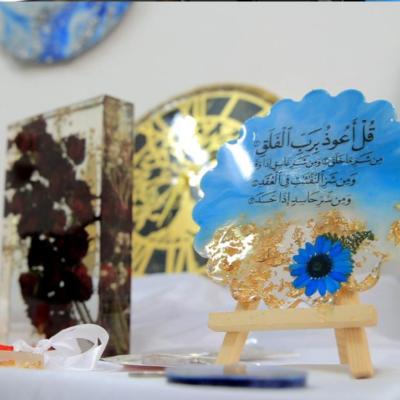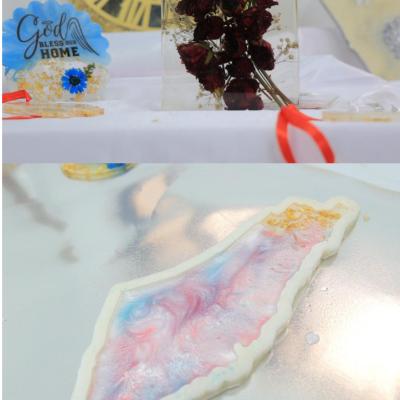Bethlehem/PNN /
In the town of Beit Sahour, amid the challenges posed by the COVID-19 pandemic that impacted so many lives, Balqees Qumsieh embarked on an inspiring journey to success in the world of handcrafted art. Like many others during that period, Balqees found herself isolated at home, unsure of how to fill the void left by the absence of her usual work. Yet, instead of succumbing to the circumstances, she chose to explore something new.
One day, while browsing social media, Balqees came across an artist from abroad creating exquisite handmade pieces using a transparent material that encased beautiful flowers. This moment sparked the idea for her project. She began researching this material—resin—and learning how to use it. Eventually, she decided to import the materials. However, the journey was far from smooth. Shipments were delayed for several months, the materials were scarce, and her project was unfamiliar to the local community.
Balqees started experimenting in a small corner of her home, destroying more than 100 pieces before mastering the craft.

She learned to mix resin with a hardener in precise ratios, a process requiring patience, as each piece takes anywhere from two to three days or even a month to complete, depending on its complexity. Despite repeated failures, she refused to give up, persisting until she mastered the art. She began creating a range of products such as keychains, car accessories, and decorative plaques, preserving flowers within the resin to give them eternal life.
Over time, Balqees began combining resin with wood—particularly olive wood—to craft unique pieces that blended artistry with natural beauty. She designed pens, clocks, and even a map of Palestine, adding a special dimension to her project. She promoted her creations on social media platforms like Instagram and Facebook and participated in local exhibitions.
However, the road was not without its challenges. Marketing her products proved difficult, especially given the current economic climate. Many consumers began importing cheap plastic alternatives from abroad, creating pricing competition. Explaining the difference between her handcrafted items—requiring time and effort—and mass-produced imports was an ongoing challenge. Nevertheless, Balqees remained steadfast, educating her audience about the value and craftsmanship of handmade work.

Despite these difficulties, there has always been a segment of people who appreciate and prefer handmade products, particularly when they are unique and customised. Each of Balqees’s pieces carries a distinctive touch, ensuring that no two items are identical. This uniqueness became the hallmark of her project, with every product reflecting a personal and artistic imprint.
As time passed, Balqees’s ambitions grew beyond local success. She began dreaming of expanding her work internationally, showcasing the essence of her craft and her homeland to the world. By incorporating olive wood from local harvest boxes, she promoted these items at international exhibitions, aiming to achieve her vision and reach a global audience.
Balqees’s story is one of determination and resilience—a tale of a woman who refused to be confined by her usual work or difficult circumstances. Instead, she chose to explore her potential and build a project that expresses her creativity and passion for craftsmanship. Her journey is a living example of how perseverance and hard work can transform challenges into opportunities, proving that anyone can achieve their dreams with belief in themselves and a commitment to their goals.
This story was produced as part of the Qarib programme implemented by CFI, the French media development agency, in partnership with and funded by AFD, the French Development Agency.
